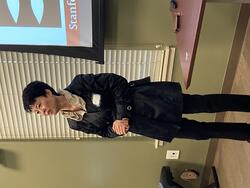SPICE Instructor Dr. Makiko Hirata Offers Workshop on “Sound Communication: How Musicality Can Enhance Your Teaching”
SPICE Instructor Dr. Makiko Hirata Offers Workshop on “Sound Communication: How Musicality Can Enhance Your Teaching”
The workshop was part of the Spring 2023 TEACH Conference, which explored the theme of belonging and wellness in teaching and learning.

On May 5, 2023, the Spring 2023 TEACH Conference attracted people from across Stanford University for professional development, networking, and socializing around undergraduate and graduate teaching and learning. The conference engaged participants in the following key topics:
- Engagement: How can we captivate students and motivate them to apply what they are learning effectively to their projects, assignments, research, and so on?
- Well-being: How can we support thriving among learners and teachers?
- Belonging: How can we invite learners and teachers to bring their whole selves to class?
Makiko Hirata touched upon each of the three key topics through her perspective and experiences as a concert pianist, educator, and researcher. Hirata opened her session on “Sound Communication” with a performance of Chopin’s “Etude Op. 25-1 in A-flat Major” a.k.a. “Aeolian Harp” and immediately drew in the audience.
Hirata demonstrated how music can encourage people to be more empathetic and imaginative through a series of short vocalization and listening exercises. Between different exercises, she interspersed research on the synching or coupling of brainwaves between listeners in effective communication. She structured her talk around four components of music—silence, rhythm, melody, and harmony—and she offered insightful remarks on how understanding such components can make people better educators who can also help to facilitate the well-being and belonging of their learners.

Her interactive session included asking the participants to sit in silence. “If you only have two minutes to relax,” Hirata told the participants, “studies show that sitting in silence is more effective than listening to so-called ‘relaxing music.’ We only have so much cognitive capacity, and the brain needs silence in between inputs to process the information it receives.” Another exercise focused on rhythm as she engaged the audience in a clapping exercise. It was a lesson on non-verbal leadership, including the importance of using breath, body language, and eye contact as cues.
Hirata also made references to neuroscience, which has documented the effects of music. A summary of this is captured in the March 31, 2023 edition of the Los Angeles Times: “When we listen to music together, our heartbeats actually start to align and we start breathing together to the lyrics. Even our brain waves start to synchronize, according to Makiko Hirata, an international concert pianist who works with neuroscientists to quantify the benefits of music on our well-being.”
After participating in her workshop, I was eager to apply these musical concepts to my teaching for more enhanced sense of belonging and engagement among my students. In addition to the four components of music, I will also keep the following four questions—outlined by Hirata—in mind as I plan my future lessons.
- How much attention do you pay to your tone of voice in the classroom?
- What is the range of your vocal inflections during your presentations?
- What is the tempo of your bullet points and rhythms in your choice of words?
- Do you know the power that sonification can give to a set of data?
Hollie Fortcamp, one of the organizers of the TEACH Conference, noted, “It was a joy to attend ‘Sound Communication’ by Dr. Makiko Hirata, SPICE, at the TEACH Conference. We are so blessed to have her expertise and delight! She captivated the room. She gave us all much to ponder about how the various aspects of musicality influence communication, especially the communication of teaching and learning. We are still talking about it.” In addition, three of the participants’ written comments noted “Makiko’s lovely piano playing and moments of silence in a great workshop”; “the measurable value of silence in information processing”; and “music/sound and more importantly, silence in teaching is important.” Fortcamp continued, “Makiko was an ideal presenter as she highlighted all three topics of the TEACH Conference—that is, engagement, well-being, and belonging.”
To stay updated on SPICE news, join our email list and follow us on Facebook, Twitter, and Instagram.
Reference:
“Can music inspire more people to care about climate change?” Los Angeles Times, 31 March, 2023; https://www.latimes.com/podcasts/story/2023-03-31/column-one-podcast-lu…



